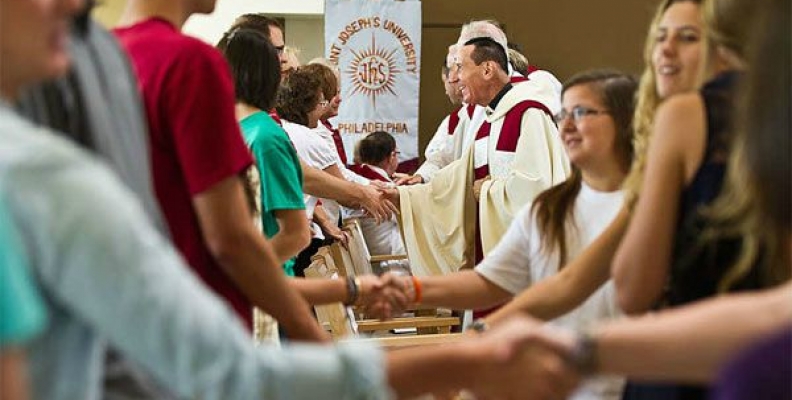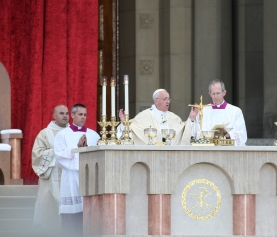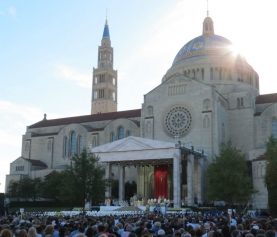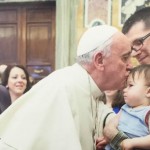
Lucia Silecchia: On Peace, Joy … and Ravioli
At a recent meeting with youth in Rome, Pope Francis recounted a brief conversation he had with a 92-year-old Italian. He reminisced that while riding through a crowd in his Popemobile, he noticed an elderly woman with gli occhi brillianti di gioia — eyes shining with joy. He stopped to greet her and asked for her secret. She responded, apparently to his surprise, that her secret was eating ravioli. (More specifically, eating homemade ravioli.)
I appreciate her reply because I know from happy experience that good, homemade ravioli can be a source of joy! Pope Francis used this recollection to encourage the youthful crowd to look to grandparents for guidance, wisdom and memories — and surprise.
While this charming anecdote was widely reported, most of Pope Francis’s remarks to the youth gathered that day focused more seriously on the Holy Father’s non-gastronomical secret to joy: seeking the peace of God in all things. In his discourse, Pope Francis spoke of the peace of God as the deepest source of his joy, in good times and in bad. He focused on three important aspects of the peace of God:
First, he taught that the deepest, most profound peace is one that only God can give. He asked youth to pray for the grace to discern the peace of God as distinct from other sources of temporary, fleeting peace that do not have divine origin. While these lesser sources of peace may look good and beautiful and bring a temporary sense of happiness, Pope Francis taught that it is only the genuine peace of God that lasts. Indeed, he warned that deceptive or “false” peace often abounds as a temptation, and he urged honest, prayerful discernment as the only way to find the true peace of God.
Second, and unexpectedly, he taught that sometimes the search for the peace of God leads to the cross. This is, indeed, a paradox, but a teaching of great comfort to all who suffer in so many ways. Certainly, the logic of the world would say that peace should be synonymous with freedom from suffering and grief. Yet, Pope Francis warned his audience that this is not always the case. Anyone who has ever done what is right but not easy, just but not popular, honest but not appreciated, loving but heartbreaking, or selfless but unnoticed will understand that there is deep peace in such sacrifices faithfully made. Pope Francis confirmed what they already know: Even in these times of trial and suffering, Christ can and does offer his peace — a genuine, lasting peace.
Third, Pope Francis promised that the peace of God bears the fruit of joy. Not a giddy happiness, or a superficial joie di vivre that depends on fragile emotion or fickle feelings to survive. But, instead, a gioia profonda — a deep, profound, and peaceful joy.
The great value of peace and a proper understanding of it should come as no surprise. During the celebration of Mass, consider how many times “peace” is invoked — “peace to people of good will” in the Gloria; “Be pleased to grant her [the Church] peace” and “advance the peace and salvation of all the world” in the eucharistic prayers; “Peace I leave you, my peace I give you” along with “The peace of the Lord be with you always” and “Let us offer each other the sign of peace” at the Sign of Peace; “grant us peace” during the Agnus Dei; and “go in peace” as we leave. Consider that peace is one of the fruits of the Holy Spirit. Consider that the words of absolution beg not only for God’s pardon, but also for His peace. Consider how the angelic welcome at the birth of Christ heralded “peace to men on whom His favor rests.” Consider how many times during His life, Christ greeted His loved ones with “Peace be with you” or bid them farewell with “Go in peace.” Christ warned that the peace He promises is not “as the world gives” — not a superficial “feel good” peace that is easily won, but the only one that leads to deep joy.
Pope Francis’s words linking peace and joy struck a familiar note for me. Last month, I found a prayer card that moved me so much that I framed it and have it at my desk as a daily reminder about joy and peace. The card bears the words of a prayer from another Francis, Saint Francis De Sales:
Do not look forward to what may happen tomorrow; the same Everlasting Father who cares for you today will take care of you tomorrow, and every day. Either He will shield you from suffering, or He will give you unfailing strength to bear it. Be at peace then, and put aside all anxious thoughts and imaginations. Amen.
I liked this beautiful prayer because it is a call to peace, but not a promise of a blithe and carefree life. In that, it is a realistic, hope-filled call to peace — hard to find, perhaps, but priceless when found.
So “be at peace” … and if you can find good homemade ravioli, enjoy!
— Lucia Silecchia is a professor of law at The Catholic University of America Columbus School of Law. She also is director of the International Human Rights Summer Law Program in Rome.








